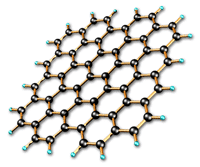The 2010 Nobel Prize for Physics was won by two scientists for their work on a revolutionary ultra-thin material called graphene, the Royal Swedish Academy of Sciences announced on Tuesday.Andre K. Geim and Konstantin S. Novoselov, both scientists at the University of Manchester in England, shared the award for their development of a form of carbon that is only one atom thick. Among its other properties, graphene is able to conduct electricity as well as copper does and to conduct heat better than any other known material, and it is practically transparent. Physicists say that it could eventually rival silicon as a basis for computer chips, serve as a sensitive pollution-monitoring material, improve flat-screen televisions, and enable the creation of new materials.Read more from the New York Times.
Two Scientists Win Nobel Prize in Physics for Work on Graphene






